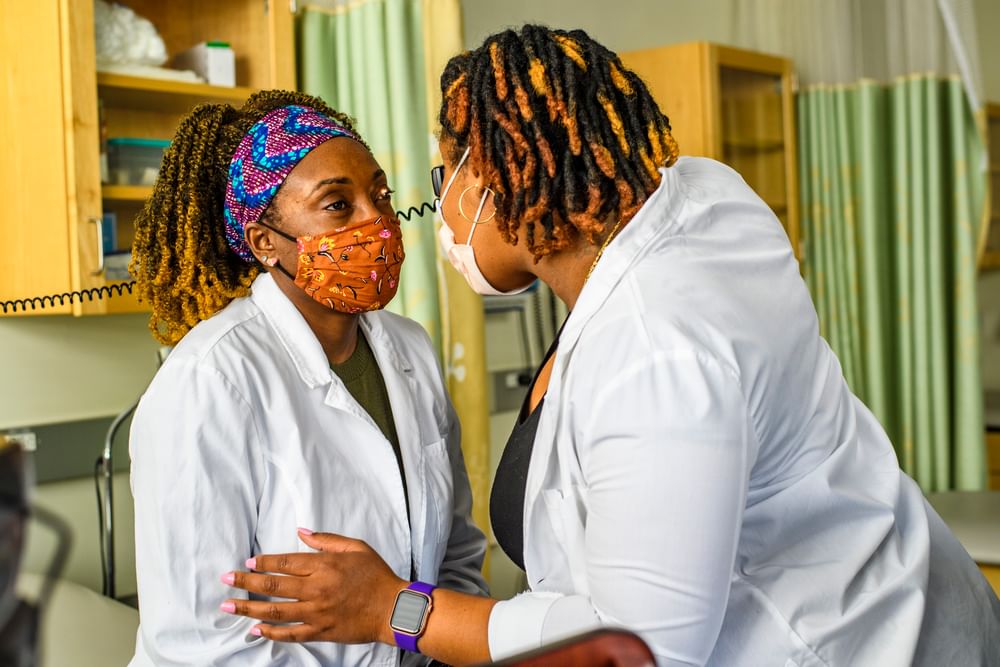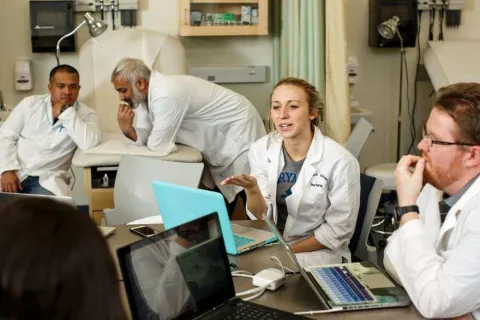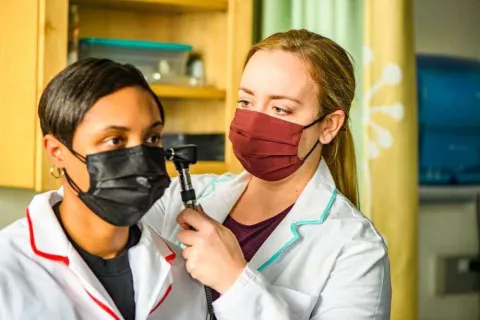From A to Z: What to Expect From an Online Nursing Program

If you have ever thought about becoming a baccalaureate nurse or pursuing graduate-level nursing education, online nursing degrees have become a popular option. The world of online nursing education has exploded with numerous programs to choose from. Online nursing programs offer many of the same degrees as traditional programs and students also benefit from a level of convenience and flexibility while earning a degree that makes them well-positioned to apply for competitive nursing roles.
Advantages of Online Nursing Programs
Accredited online nursing programs offer the same academic rigor and clinical preparation as traditional in-person programs. Upon graduation, you will be just as prepared with your nursing education as counterparts who have chosen a traditional program. Employers will view you as a strong candidate, and you will have benefited from the many perks of taking a program online.
Convenience and Flexibility
- Online nursing programs allow for course attendance from your own home or in an environment where you’re most comfortable. Students will still need to travel to their clinical placements or on-campus residency, however.
- Most coursework will be completed asynchronously when it fits into your schedule.
- Students will find it easier to track assignments and stay organized with their school’s Learning Management System, with the ability to access digital material from any location.
- Many graduate-level nursing programs are part-time, and students can continue their current employment simultaneously with their coursework.
Comfortable Learning Environment
You can select your environment for learning, empowering you to select a setting where you know you learn best. The digital presentation of material ensures that you can view lesson material without any obstructions. You can optimize your learning around the time of week that works best, while still working towards specific due dates and weekly milestones and assignment submissions.
Considerations for Online Nursing Programs
Familiarity with technology, self-motivation and engaging with the school community are keys to success with online programs. If you are wondering whether an online program is isolating, look at online testimonials from students to learn how responsive the faculty are to students and how they are able to interact online.
Technology Skills
- Requires a computer and proficient technology skills to use it
- Access to a reliable internet connection
- Ability to use multiple communication platforms
Time Management
- As most coursework is completed independently, students must be self-motivated
- Most communication occurs digitally, requiring strong communication skills and extra time
Clinical Rotations & Residencies
All online nursing programs that are clinically focused (e.g., FNP, CNS, midwife) will require clinical rotations and/or residencies where nursing students will put their new knowledge and skills into practice. Many clinicals and residencies can be coordinated with health care facilities near your home; however, some programs may require travel to locations determined by the school. Carefully review each program’s clinical rotation and residency requirements and the process for clinical placement; understanding if you will need to find your own clinical placement or whether the school offers clinical placement support.

Online Course Framework
Nursing students will find the online experience multimodal and able to fit a variety of learning styles. Courses can be synchronous—occurring simultaneously when the instructor gives instruction often through video conferencing, or asynchronous—accessing course content when it fits your schedule. Nursing courses may include:
- Online lectures
- Case study-based scenarios
- Independent projects
- Group projects
- Scholarly writing
- Exams
Options for communication include:
- Online discussion boards
- Video conferencing
Request My Free Marymount Accelerated BSN Program Guide
Enrollment Requirements
Enrollment amongst all baccalaureate nursing (BSN) programs, whether in person or online, requires a high school diploma or a GED. Typically, the following requirements must be met:
- GPA of at least 2.5
- Prerequisite courses: These courses vary, but often include life science courses such as chemistry, developmental psychology, human anatomy and physiology, pathophysiology, microbiology and statistics
Additionally, there are accelerated baccalaureate nursing (ABSN) programs that do not require any previous nursing experience. However, ABSN programs do require an undergraduate degree in another discipline.
Enrollment requirements for graduate nursing programs vary by program. Most master’s level programs require a BSN and RN licensure. However, there are some direct entry master’s degrees that prepare you for practice as an RN or advanced practice nurse (APRN) for those students who hold a non-nursing degree. Doctoral programs will require a BSN and RN license at a minimum.
Carefully read each program’s requirements, noting:
- Deadlines
- Essays
- Letters of recommendation
- Official transcripts
- Volunteer experience
Types of Nursing Programs
Multiple online nursing degrees are available. Prospective students will want to explore their options and know what type of program will meet their career plans.
Bachelor of Science in Nursing (BSN)
Online BSN degrees are available for two distinct types of students.
- RN-to-BSN programs are available for students who previously completed an associate’s degree in nursing and are already licensed RNs and wish to pursue advanced education to meet their career goals. These programs can be completed in 18 to 24 months.
- The Accelerated Second Degree Bachelor of Science in Nursing degree is for anyone who holds a bachelor’s degree in an unrelated field. Students looking for a career transition will find themselves able to complete this degree within 12 and 19 months.
Master of Science in Nursing (MSN)
Students wishing to pursue education for a specialized area in nursing need to have nursing experience with a BSN or identify a direct entry master’s program. With an MSN degree, you have the ability to work as a clinical nurse specialist or in leadership roles. Some MSN degrees provide training to be licensed as a nurse practitioner. Some popular tracks for MSN programs include:
- Family nursing
- Business administration
- Education
- Informatics
- Midwifery
- Nurse anesthetist
- Psychiatric mental health
Typically, MSN programs can be completed in 15 to 24 months for full-time students and 24 to 48 months for part-time students.
Doctorate of Nursing Practice (DNP)
The doctoral-level program offers career opportunities for nurses with career goals, including top administrative or teaching positions, working as a nurse practitioner or pursuing nursing research. DNP programs are available to nurses via two paths—BSN to DNP, or post-master’s to DNP. The length of time to complete a DNP program is two to three years depending on prior education and full or part-time plan of study.
Program Accreditation
When researching online nursing programs, verifying accreditation is a top priority. Accreditation and type of accreditation impacts whether students can receive federal financial aid, can transfer credits and qualify to take the NCLEX exam. According to the US Department of Education, the accreditation process:
- Verifies that an institution or program meets established standards
- Requires goal setting for continuous improvement of academic excellence to stimulate the advancement of standards among educational institutions
- Establishes criteria for professional certification and licensure, and for upgrading courses offering such preparation
There are two possible types of accreditation—regional and national. Nursing schools can be accredited regionally, nationally or both.
Regional Accreditation
The Council for Higher Education Accreditation (CHEA) oversees regional accreditation. The regional accreditation process is older, more prestigious and mostly utilized for universities that are state-owned or nonprofit universities. Credits from regionally accredited schools are typically accepted at both regionally and nationally accredited schools.
National Accreditation
Two main organizations that oversee national accreditation are the Accreditation Commission for Education in Nursing (ACEN) and the Commission on Collegiate Nursing Education (CCNE). The ACEN provides accreditation for diploma, associates, bachelor’s and post-bachelor’s degrees, whereas the CCNE provides accreditation for bachelor’s and master’s programs. National accreditation is generally used by for-profit schools, and credits may only be accepted or transferred amongst other nationally accredited schools.
An accredited online nursing program demonstrates academic rigor, and online nursing students will be as well respected by employers as in-person students.
Working with a Student Advisor
Working with a student success advisor assists students throughout their nursing courses. Well-versed on program requirements, student success advisors will help track program progress and help students develop career goals. They will help answer student questions and provide encouragement.

Tips for Online Nursing Program Success
- Career planning - Thinking through how you see your future in nursing will help you pick the right nursing degree and program. Having a goal keeps you motivated during your rigorous educational program.
- Create goals - Create specific, reasonable and measurable goals to decrease any overwhelming feelings that may occur. These goals will help you stay organized, track progress and ensure work is complete.
- Make a schedule - Carefully plan a schedule to include time for coursework and other life duties each day to ensure you have time for each.
- Eliminate distractions - When taking the time to complete coursework, eliminate distractions that may disrupt your studies. Place your phone away from your work area, turn off communication alerts and make sure others nearby know you will be completing your coursework.
- Practice self-care - Make sure you establish good habits to support your success. Getting enough exercise and sleep and having a healthy diet will support the additional demands of schooling. Additionally, staying connected with family and friends will offer emotional support.
The entry-level option for students with non-nursing undergraduate degrees is the Online ABSN. In just 16 months, Online ABSN students complete the following requirements in preparation for RN careers:
- An on-campus residency
- Clinical placements in Virginia
- 100% online courses on topics like Research and Evidence-Based Practice
Marymount’s ABSN is accredited by the Commission on Collegiate Nursing Education (CCNE). Nursing courses at Marymount are taught by practicing APRNs who can speak with authority about the profession. The university’s stellar reputation is confirmed by top U.S. News & World Report rankings in its National Universities and Nursing categories.
If you want to become an RN, contact one of our student advisors to discuss if this program is right for you.
